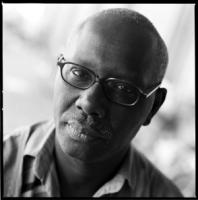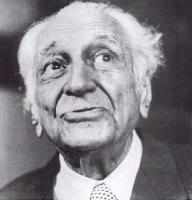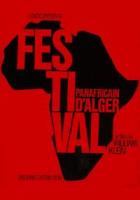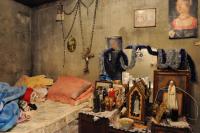 "Our Forbidden Places", an extraordinary documentary by Leila Kilani, returns to the political repression in Morocco in the time of Hassan II. Three generations of Moroccans evoke a completely human story of heroism and fortitude. Belying their serenity, all the characters form a perfect picture of Morocco today –they are still frightened by memories of being “buried alive” in Tazmamart prison and of countless cries of despair that few dared even to listen to. "Our Forbidden Places" is not really a film about a particular country, but rather it echoes all human memories of torment by extreme forms of state violence, be it blind or selective.
"Our Forbidden Places", an extraordinary documentary by Leila Kilani, returns to the political repression in Morocco in the time of Hassan II. Three generations of Moroccans evoke a completely human story of heroism and fortitude. Belying their serenity, all the characters form a perfect picture of Morocco today –they are still frightened by memories of being “buried alive” in Tazmamart prison and of countless cries of despair that few dared even to listen to. "Our Forbidden Places" is not really a film about a particular country, but rather it echoes all human memories of torment by extreme forms of state violence, be it blind or selective.
Afroscreen
06.06.2010 | by Boubacar Boris Diop
 In fact, to take up arms to dominate a people is, above all, to take up arms to destroy, or at least to neutralize, to paralyze, its cultural life. For, with a strong indigenous cultural life, foreign domination cannot be sure of its perpetuation. At any moment, depending on internal and external factors determining the evolution of the society in question, cultural resistance (indestructible) may take on new forms (political, economic, armed) in order fully to contest foreign domination.
In fact, to take up arms to dominate a people is, above all, to take up arms to destroy, or at least to neutralize, to paralyze, its cultural life. For, with a strong indigenous cultural life, foreign domination cannot be sure of its perpetuation. At any moment, depending on internal and external factors determining the evolution of the society in question, cultural resistance (indestructible) may take on new forms (political, economic, armed) in order fully to contest foreign domination.
Mukanda
02.06.2010 | by Amílcar Cabral
 “Geo-archaeological research(GAR)” is a research, held initially in Weimar (Germany), which has indicated several phases of work and diverse areas as fieldwork. This research aims to understand specific intercontinental geological phenomena, proposing the hypothesis of a geological fault, which took place in Europe and had other repercussions.
“Geo-archaeological research(GAR)” is a research, held initially in Weimar (Germany), which has indicated several phases of work and diverse areas as fieldwork. This research aims to understand specific intercontinental geological phenomena, proposing the hypothesis of a geological fault, which took place in Europe and had other repercussions.
To read
28.05.2010 | by Tânia da Fonte
 José Cabral came to this collective history in a unique way, having trained with his father amateur photographer and filmmaker — he also had a homonymous grandfather, on his father’s side, who was a governor (1910-1938) and who had a park named after him in the old capital Lourenço Marques (Continuadores Park, today). He started in cinematography and he joined his experience as a news photographer to documental programmes of a less urgent nature. Later, he was probably the first to distance himself from the routines of journalism, and he made that challenge very clear with the choice of works in display in the Iluminando Vidas exhibit: instead of war, misery, victims, ruins and promises of reconstruction, that can still be seen yet another face for exoticism, he showed feminine nudes without any ethnographical pretext.
José Cabral came to this collective history in a unique way, having trained with his father amateur photographer and filmmaker — he also had a homonymous grandfather, on his father’s side, who was a governor (1910-1938) and who had a park named after him in the old capital Lourenço Marques (Continuadores Park, today). He started in cinematography and he joined his experience as a news photographer to documental programmes of a less urgent nature. Later, he was probably the first to distance himself from the routines of journalism, and he made that challenge very clear with the choice of works in display in the Iluminando Vidas exhibit: instead of war, misery, victims, ruins and promises of reconstruction, that can still be seen yet another face for exoticism, he showed feminine nudes without any ethnographical pretext.
Face to face
28.05.2010 | by Alexandre Pomar
 Recent critical readings of Cape Verdean identity and intellectual history highlight the fact that Gilberto Freyre unknowingly destabilized the metanarrative of Euro-centered mestiçagem, by emphasizing instead Cape Verde’s cultural links to Africa (even if those links were impressionistically perceived by him).
Recent critical readings of Cape Verdean identity and intellectual history highlight the fact that Gilberto Freyre unknowingly destabilized the metanarrative of Euro-centered mestiçagem, by emphasizing instead Cape Verde’s cultural links to Africa (even if those links were impressionistically perceived by him).
To read
26.05.2010 | by Fernando Arenas
 Gregory Maqoma, South-African dancer and choreographer, uses his origins to build his identity as an artist. The performer came to Luanda to present 'Beautiful Me', a show in which he is the only participant, and that reflects some of his concerns about south-african society and the political power as a whole, around the world
Gregory Maqoma, South-African dancer and choreographer, uses his origins to build his identity as an artist. The performer came to Luanda to present 'Beautiful Me', a show in which he is the only participant, and that reflects some of his concerns about south-african society and the political power as a whole, around the world
Face to face
24.05.2010 | by Joana Simões Piedade
 Africa is portrayed as an over-determined image. In other words, a place capable of shaping the abundance of circulating discourses, the terms and labels for the continent and the situations of traumatic nature. The widespread geography that characterises Africa both internal and externally, the continent remains a space of ambivalence that still polarizes fundamental issues as human rights, racial equality, apartheid, subordination, hybridization, mixing, the displacement of people and cultures.
Africa is portrayed as an over-determined image. In other words, a place capable of shaping the abundance of circulating discourses, the terms and labels for the continent and the situations of traumatic nature. The widespread geography that characterises Africa both internal and externally, the continent remains a space of ambivalence that still polarizes fundamental issues as human rights, racial equality, apartheid, subordination, hybridization, mixing, the displacement of people and cultures.
I'll visit
23.05.2010 | by Marta Mestre
 One part of the programm of the 7th Festival de Cine Africano de Tarifa, is called: "Utopia and Reality: 50 years of African Independencies?" Coinciding with the 50th anniversary of the Independence of 17 African countries, FCAT’10 offers a selection of African and non-African productions that explores, illustrates, questions and analyses this independence. There are films which talk about the life and ideas of figures like Aimé Césaire, Patrice Lumumba or Amilcar Cabral, or about the hope and dignity found after so many years of colonialism.
One part of the programm of the 7th Festival de Cine Africano de Tarifa, is called: "Utopia and Reality: 50 years of African Independencies?" Coinciding with the 50th anniversary of the Independence of 17 African countries, FCAT’10 offers a selection of African and non-African productions that explores, illustrates, questions and analyses this independence. There are films which talk about the life and ideas of figures like Aimé Césaire, Patrice Lumumba or Amilcar Cabral, or about the hope and dignity found after so many years of colonialism.
I'll visit
23.05.2010 | by Tarifa African Film Festival
 Subjects like discrimination – by skin color, social position or gender- all found an important place in Ingrid’s work. Gradually she has been focusing on conflict issues and the reasons why we live in violence.
In addition to her interest in subjects like the war and the media she is also very interested in the role of women, their strength and their projection in the world. Regarding that she stats “we can’t run away from our body. At the beginning it was not an easy thing to do but I acquired consciousness that my black woman’s body is, by itself, a statement. Then I started to work on this matter”.
Subjects like discrimination – by skin color, social position or gender- all found an important place in Ingrid’s work. Gradually she has been focusing on conflict issues and the reasons why we live in violence.
In addition to her interest in subjects like the war and the media she is also very interested in the role of women, their strength and their projection in the world. Regarding that she stats “we can’t run away from our body. At the beginning it was not an easy thing to do but I acquired consciousness that my black woman’s body is, by itself, a statement. Then I started to work on this matter”.
Face to face
22.05.2010 | by Joana Simões Piedade
 The Portuguese presentation at the 2009 São Paulo Architecture Biennial, “Five Africas/Five Schools”, reflects the different realities of the African countries whose official language is our own: for each of them a school prototype developed by a like number of architecture teams. For Guinea-Bissau, Pedro Maurício Borges has designed a Basic School in the city of Cacheu. In a context of extreme poverty , the possibility of building a school should suffice to suspend any other kind of critical judgment. Nevertheless, beyond the initiative’s eventual humanitarian value, there is still architecture. In a place where like everything else it is limited by what exists, one has to make do with very little. But with many other things as well: with memories of a country that interested the world.
The Portuguese presentation at the 2009 São Paulo Architecture Biennial, “Five Africas/Five Schools”, reflects the different realities of the African countries whose official language is our own: for each of them a school prototype developed by a like number of architecture teams. For Guinea-Bissau, Pedro Maurício Borges has designed a Basic School in the city of Cacheu. In a context of extreme poverty , the possibility of building a school should suffice to suspend any other kind of critical judgment. Nevertheless, beyond the initiative’s eventual humanitarian value, there is still architecture. In a place where like everything else it is limited by what exists, one has to make do with very little. But with many other things as well: with memories of a country that interested the world.
City
17.05.2010 | by Diogo Seixas Lopes
 On the one hand I try to understand how African dance and as African considered corporalities are used as an aesthetic medium in common European cultural practices. How does European discourse create which images of African dance and performances? On the other hand and crucially, I focus on the African side of the coin: how do African dancers and choreographers (re)act and which are their individual choices in the scope of various challenges and do European discourse have any significance on African dancers’ and choreographers’ decisions?
On the one hand I try to understand how African dance and as African considered corporalities are used as an aesthetic medium in common European cultural practices. How does European discourse create which images of African dance and performances? On the other hand and crucially, I focus on the African side of the coin: how do African dancers and choreographers (re)act and which are their individual choices in the scope of various challenges and do European discourse have any significance on African dancers’ and choreographers’ decisions?
Stages
16.05.2010 | by Nadine Siegert
 Filmed in 1965, “Catembe”, is a fictional documentary directed by Manuel Faria de Almeida about the everyday life in Lourenço Marques. The most outstanding aspect of this film is the fact that it represents the first critical interpretation of the Portuguese colonial reality. After the original piece was censored – with 103 cuts and obliteration of the censored parts – the second version was banned. Only half of its 2400 original metres survived, which led to a reference in the Guinness Book of Records as the film with most censored cuts in the history of cinema.
Filmed in 1965, “Catembe”, is a fictional documentary directed by Manuel Faria de Almeida about the everyday life in Lourenço Marques. The most outstanding aspect of this film is the fact that it represents the first critical interpretation of the Portuguese colonial reality. After the original piece was censored – with 103 cuts and obliteration of the censored parts – the second version was banned. Only half of its 2400 original metres survived, which led to a reference in the Guinness Book of Records as the film with most censored cuts in the history of cinema.
Afroscreen
16.05.2010 | by Maria do Carmo Piçarra
 In sub-Saharan Africa - with the possible exception of South Africa - the prohibitive cost to produce films, the poor state of cinema houses, the absence of governmental support for filmmaking, and the large offer of foreign films have tied many filmmakers to foreign funding, equipment, expertise, and audiences. Thus, African films have been dependent on overseas financial support which conduces to a type of cinematography not always well-received by African audiences.
In sub-Saharan Africa - with the possible exception of South Africa - the prohibitive cost to produce films, the poor state of cinema houses, the absence of governmental support for filmmaking, and the large offer of foreign films have tied many filmmakers to foreign funding, equipment, expertise, and audiences. Thus, African films have been dependent on overseas financial support which conduces to a type of cinematography not always well-received by African audiences.
Afroscreen
15.05.2010 | by Alessandra Meleiro
 What Mónica de Miranda intends is “to create space so that the migratory and trans–national flows are seen by themselves as a diversified and multifaceted reality as a platform for creative opportunities and a place of transit for personal, social and cultural changes. "At the heart of its strategy is the principle of interculturality, which should involve a gradual and systematic promotion of spaces and processes of positive interaction, a possible generalization of relations of trust, mutual recognition, for discussion, learning and exchange.
What Mónica de Miranda intends is “to create space so that the migratory and trans–national flows are seen by themselves as a diversified and multifaceted reality as a platform for creative opportunities and a place of transit for personal, social and cultural changes. "At the heart of its strategy is the principle of interculturality, which should involve a gradual and systematic promotion of spaces and processes of positive interaction, a possible generalization of relations of trust, mutual recognition, for discussion, learning and exchange.
Face to face
15.05.2010 | by José António Fernandes Dias
 It seems useful to delineate a genealogy of black internationalism as way to understand it's formation. Africa's independencies, beyond the action of africans and africans among the diaspora, take place due to a number of structural shifts. If we place the emergence of african internationalism in a broader perspective it will allow for a understanding of the paradigm changes that took place at the turn of the century.
It seems useful to delineate a genealogy of black internationalism as way to understand it's formation. Africa's independencies, beyond the action of africans and africans among the diaspora, take place due to a number of structural shifts. If we place the emergence of african internationalism in a broader perspective it will allow for a understanding of the paradigm changes that took place at the turn of the century.
To read
15.05.2010 | by António Tomás
 As in any occupied house it has it’s living and organizational rules. There, the following representatives rule: the unity secretary and the secretary of the hallway, block and floor who meet up to solve the residents’ problems, and to conduct the residents’ court in one of the hotel’s former suites. There, discussions concerning who is more entitled to housing (a woman with children has the upper hand), or about who is throwing dirty water onto someone else’s balcony, take place. There are two fundamental rules: “keep the cleanliness and the respect.”
As in any occupied house it has it’s living and organizational rules. There, the following representatives rule: the unity secretary and the secretary of the hallway, block and floor who meet up to solve the residents’ problems, and to conduct the residents’ court in one of the hotel’s former suites. There, discussions concerning who is more entitled to housing (a woman with children has the upper hand), or about who is throwing dirty water onto someone else’s balcony, take place. There are two fundamental rules: “keep the cleanliness and the respect.”
City
14.05.2010 | by Marta Lança
 How is cosmopolitanism to be practiced, if the city persists in creating barriers between insiders and outsiders? If traditional boroughs of Lisbon are inhabited by recent immigrants, they are easily fixed into specific territories, such as Martim Moniz, Praça de S. Domingo or Restauradores, some parts of Alfama, former Jewish and Moorish ‘ghettos’, a testimony to the ever permanent ‘multicultural’ character of the city, as well as its more tolerant and racist moments.
How is cosmopolitanism to be practiced, if the city persists in creating barriers between insiders and outsiders? If traditional boroughs of Lisbon are inhabited by recent immigrants, they are easily fixed into specific territories, such as Martim Moniz, Praça de S. Domingo or Restauradores, some parts of Alfama, former Jewish and Moorish ‘ghettos’, a testimony to the ever permanent ‘multicultural’ character of the city, as well as its more tolerant and racist moments.
City
13.05.2010 | by Manuela Ribeiro Sanches
 November 1975, quick as lightening thousands of persons flee the city. The colony is over, the counting begins from zero. Luanda is now an empty space and waits, anxious, for its new tenants. New habitants, new freedom. Like “squatters” now inside buildings marked by old moments, memories, scents from another time, Luanda anticipates and receives the new occupants with open doors.
November 1975, quick as lightening thousands of persons flee the city. The colony is over, the counting begins from zero. Luanda is now an empty space and waits, anxious, for its new tenants. New habitants, new freedom. Like “squatters” now inside buildings marked by old moments, memories, scents from another time, Luanda anticipates and receives the new occupants with open doors.
City
13.05.2010 | by Kiluanji Kia Henda
 It's not up to the neo-animists to invent anything or to feel forced to do so. On the contrary it is to insist on the evocation of all knowledges and on the review of all data, documents and materials available. They might reveal other answers, having both time and situation changed, that go beyond those found by former researchers or even by those who collected them or put them in order.
It's not up to the neo-animists to invent anything or to feel forced to do so. On the contrary it is to insist on the evocation of all knowledges and on the review of all data, documents and materials available. They might reveal other answers, having both time and situation changed, that go beyond those found by former researchers or even by those who collected them or put them in order.
Ruy Duarte de Carvalho
16.04.2010 | by Ruy Duarte de Carvalho
 The work presented by Yonamine in this exhibition speaks about the idea of erasure.
Yonamine comes from an erased country, Angola. A country which history, instead of working as a palimpsest – that is, a text over which multiple writings were produced leaving notice of those preceding them – has always worked as an erasing process. History has been erased in the name of a bigger interest. The Portuguese colonial past that Yonamine evokes with a subtle irony in the exhibition's title and in the tobacco boxes series was removed by the sudden decolonization process, which, by its turn, was erased by the war that now is being erased by peace.
The work presented by Yonamine in this exhibition speaks about the idea of erasure.
Yonamine comes from an erased country, Angola. A country which history, instead of working as a palimpsest – that is, a text over which multiple writings were produced leaving notice of those preceding them – has always worked as an erasing process. History has been erased in the name of a bigger interest. The Portuguese colonial past that Yonamine evokes with a subtle irony in the exhibition's title and in the tobacco boxes series was removed by the sudden decolonization process, which, by its turn, was erased by the war that now is being erased by peace.
Face to face
14.04.2010 | by Paulo Cunha e Silva